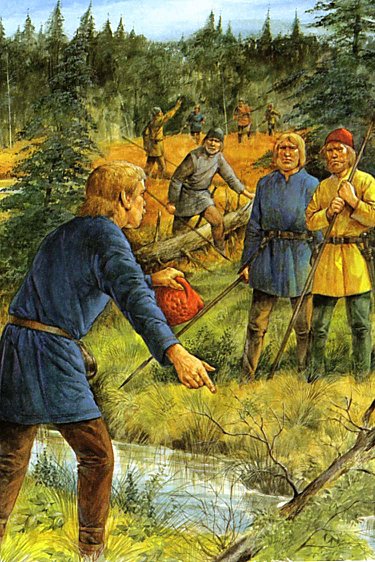
|

|
Tyrkir
born: in the lands now part of Germany
died: in Greenland
Not every character in the sagas is a heroic figure or a leader in society. Tyrkir was a family servant who was part of Leifur's voyage of exploration to Vínland. One of the reasons the sagas are valuable is that they tell stories not just about the elite and the heroic, but about ordinary people as well. It wasn't just the high-class and wealthy who participated in Viking-age adventures.
The incident also illuminates the closeness of the relationship between a family servant and the people he served. After arriving in this new land, Leifur set up a base camp (thought to be at L'Anse aux Meadows, where Norse-era houses have been excavated). From this camp, Leifur sent out search parties. Each day, half the crew stayed at the houses, while the other made day trips away from the site to discover what they could about the new land. On one of these journeys, Tyrkir became separated from the rest of the group.
 |
One evening, it happened that one man, the southerner Tyrkir, was missing from their company. Leif was very upset by this, as Tyrkir had spent many years with him and his father. Leif prepared to go search for Tyrkir, but they had gone only a short distance from the houses when Tyrkir came towards them. Leif soon realized that the companion of his childhood was pleased about something. Leif asked him, "Why are you so late returning, foster-father, and how did you get separated from the rest?" For a long time, Tyrkir only spoke in German, with his eyes darting in all directions and his face contorted. They understood nothing of what he was saying. After a while, he spoke in Norse: "I had gone only a bit further than the rest of you. But I have news to tell you: I found grapevines and grapes." "Are you sure of this, foster-father?" Leif said. "I'm absolutely sure," he replied, "because where I was born there was no lack of grapevines and grapes." Grćnlendinga saga, ch. 3 |
Grapes would have been prized for many reasons, not the least of which is that they could be made into wine for feasts and celebrations, adding to the prestige of the host who had the resources to serve such a rare drink. Accordingly, Leifur gave the land the name Vínland (wine land). Leifur also prized the grape vines that could be used where tough cordage was needed, as well as the trees that were found. Leifur ordered that the ship be filled with grapes, grapevines, and trees to take back to Greenland, all of which would have been highly valued commodities there.
|
|
©2013-2026 William R. Short |